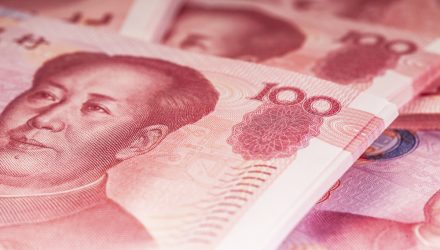China’s economy — the world’s second-largest — is recovering thanks in large part to policymakers there halting coronavirus restrictions. As a result, the potential benefits and investment implications are widespread, but investors would do well to drill down on exactly what sectors and industries are best-positioned to rise as the Chinese economy recovers.
Perhaps surprising to some market participants is the point that as this behemoth economy rebounds, there’s debate emerging about goods and services — as in, which is the better way to tap the resurgence. Fortunately, exchange traded funds ease the burden of solving that riddle. Enter the KraneShares CSI China Internet ETF (KWEB).
A recent sell-off could present investors with a buying opportunity in the dominant China internet ETF. Equally as important, KWEB is positioned to capitalize on Chinese consumers prioritizing services over cyclical goods.
“Against this macro backdrop, we believe that services such as tourism, transportation and food services will drive the recovery. During the pandemic, mobility restrictions and social distancing policies caused a much more serious drag on services compared to good producers- and China is no exception to this pattern,” noted Morgan Stanley’s Diego Anzoategui — a member of the bank’s global economics team.
While KWEB holdings such as Alibaba (NYSE: BABA) and JD.com (NASDAQ: JD) are perceived as levered to the cyclical goods trade, the former has services inroads, as does the ETF at large. For example, KWEB top-10 holding Trip.com, which accounts for 4.43% of KWEB’s roster, is obviously levered to resurgent travel in China.
In March, Macau posted its best month of gross gaming revenue (GGR) since January 2020. For investors considering KWEB, that’s pertinent because more than eight out of every 10 visitors to the casino enclave are from mainland China or Hong Kong.
Assuming that China’s consumer cyclical recovery is rooted in services, KWEB becomes all the more relevant to investors because benefits derived from a services-driven rebound are likely to be confined to China, not spread to other developing economies.
“If China’s acceleration were to be goods driven, Asia and LatAm commodity exporters would be clear beneficiaries, particularly economies like Korea, Taiwan, Argentina, Brazil and Chile,” concluded Anzoategui. “But the situation is different when services lead the way, and the relative advantage of manufacture-intensive Asian economies is less obvious in this case. Ultimately, our work suggests a more services driven rebound in China would be less relevant for the global economy.”
For more news, information, and analysis, visit the China Insights Channel.
The opinions and forecasts expressed herein are solely those of Tom Lydon, and may not actually come to pass. Information on this site should not be used or construed as an offer to sell, a solicitation of an offer to buy, or a recommendation for any product.

